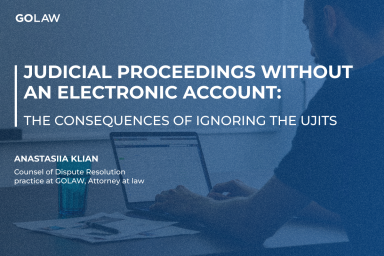Substantial developments in the restoration of lending in Ukraine
Substantial developments in the restoration of lending in Ukraine
Over the past year the pace of lending in Ukraine has gradually started to gather momentum. This is due primarily to the adoption of the Law of Ukraine No. 2478-VIII On Amendments to Certain Legislative Acts of Ukraine Regarding the Restoration of Lending (“Law No. 2478-VIII”). Law No. 2478-VIII introduces important developments to the loan legislation of Ukraine, and above all, to protect the interests of creditors and mortgage holders. Such improvements also have a positive impact on the rights of debtors and mortgagors.
It is apparent that the dynamics of attracting foreign direct and domestic investments into the state economy directly depends on transparency, legal certainty and unity of law and judge-made law as regards to the lending. An unfavourable credit and investment environment threatens prudent secured borrowers who are interested in available credit resources, but due to inadequate credit policies in Ukraine, are deprived of the opportunity to attract bank financing on advantageous terms.
Each foreign or domestic creditor calculates all related risks before starting lending processes. When it comes to resumption of lending, it is first and foremost important that the borrower shall be interested in applying for a loan, as well as in lowering the cost of credit resources, which includes the amount of the interest rate.
Ukrainian judge-made law and law- enforcement practices are less than perfect, but there are also some positive developments in the resumption of lending. In this article I will provide a summary of how lending renewal has changed and what problems still remain; and further analyse Ukrainian judge-made law and recent legislative improvements.
Legal changes
The law practice of the Supreme Court of Cassation has had an effect on the provisions of the Civil Code of Ukraine (Part 5 of
Article 543). The amendments refer to the following: that liquidation of a joint debtor as a legal entity or the death of a joint debtor as an individual shall not alter the separate obligations of the remaining joint debtors to the creditor, and shall not affect the list of loan obligations which significantly reduces the risks for creditors.
Another important amendment concerns loan debt repayment. From now on, any subsequent requirements of the mortgagee concerning the execution by the corporate debtor or individual debtor of the main obligation are valid, unless otherwise provided by the contract. Now, unless otherwise provided by the contract, the creditor may demand the debt repayment in the amount remaining after recovering the object of mortgage but in an extrajudicial way. As for individuals, this rule does not apply by default, since such terms shall be pre-envisaged in the mortgage contract. The judge-made law of the Supreme Courtfollows the same path. The Supreme Court (case No. 756/31271/15, ruling of 20 June 2018) took the position according to which the claim to recover from the defendant part of the debt that was not repaid due to the sale of the subject of the mortgage is null and void. However, the appearance of the relevant rules helps to increase creditworthiness and the procedure of loan debt repayment becomes more transparent and predictable for the creditor.
The problem of simultaneous collection of arrears and foreclosure on the subject of mortgages has also been resolved. The Supreme Court has unified the position regarding foreclosure on the subject of a mortgage in a ruling in an action raised to recover arrears under a loan contract. According to the previous judge-made law, the simultaneous collection of the debt amount from the debtor and recovery of the mortgage property belonging to the guarantor was unlawful. It was believed that such actions lead to the recovery in the interests of the creditor of the same debt amount simultaneously from both the debtor and the guarantor. The new Supreme Court has interpreted the simultaneous collection of arrears differently (case No. 921/107/15-g/16, ruling dated 18 September 2018), so that the foreclosure of a mortgage is a distinct requirement from the claim for recovery of arrears. The existence of a court ruling to recover from the debtor in favor of the creditor’s debt under a loan agreement is not a ground for termination of the debtor’s monetary obligation and termination of the mortgage. From now on the creditor is not deprived of the right to satisfy the claims under the main obligation by recourse to a mortgage in case of a decision to recover the debt. In the case of execution of one of the court decisions, the main obligation ceases and another executive document is not enforceable.
The problem of determining the initial price of the mortgage item is now agreed. One of the main obstacles to the rapid settlement of such disputes was the question of determining the initial price of the mortgage item, since its indication is a mandatory part of any court decision to enforce a mortgage by its implementation. At the same time such price should be set at a level not lower than the typical prices for such kind of property basing on the evaluating assessment. So, there are some cases when the mortgagors, in order to postpone court decision, question the correctness of the initial property price for its further sale. At the same time, such arguments are taken into consideration by the courts in almost every case. As a result, courts conduct an appropriate examination, and resolution of the case can be delayed by up to one year. But the new Supreme Court (case No. 372/3785/15, ruling dated 27 June 2018) questioned whether it is necessary to conduct such forensic examination and, as a result, has transferred this procedure to the stage of enforcement proceedings and thus made it possible not to indicate the initial selling price of the mortgage item in a court decision.
Over the last year many of the issues relating to mortgage collection have been resolved. Such amendment facilitates the procedure for a foreclosure and clarifies the contradictory position of the Ukrainian Supreme Court in this matter. At the same time, however, some issues remain unresolved; of those, most arise at the stage of execution of a court decision on foreclosure for a mortgage.
This article was first published in the IBA Litigation Committee newsletter in September 2019, and is reproduced by kind permission of the International Bar Association, London, UK. © International Bar Association.

Dr. Valentyn Gvozdiy
Managing Partner, Attorney at law, PhD
- Contacts
- 31/33 Kniaziv Ostrozkykh St, Zorianyi Business Center, Kyiv, Ukraine, 01010
- v.gvozdiy@golaw.ua
- +38 044 581 1220
- Recognitions
- ITR World Tax 2025
- LEXOLOGY INDEX 2025
- The Legal 500 EMEA 2023
- Who’s Who Legal 2022
Sign up to be aware
New achievements are inspired by information. GO further, don’t miss out GOLAW news and legal alerts
Our expertise
-
- Antitrust and Competition
- Banking and Finance
- Compliance, Corporate Governance and Risk Management
- Corporate and M&A
- Criminal and White Collar Defence
- Defense in Anti-corruption procedures and regulations
- Labor and Employment
- Natural Resources and Environment
- Government Relations (GR)
- Insolvency and Corporate Recovery
- Intellectual property
- International trade
- Legal support of business and private Сlients in Germany
- Litigation and dispute resolution
- Private clients
- Real Estate and Construction
- Energy and Natural Resources
- Restructuring, Claims and Recoveries
- Martial Law
- Tax and Customs
-
- Agribusiness
- Aviation
- Chemical industry
- Engineering, Construction and Building Materials
- Natural Resources and Environment
- Financial institutions
- IT and AI
- Industry and manufacturing
- Healthcare industries, Life sciences and Pharmaceuticals
- Media, Entertainment, Sports and Gambling
- Retail, FMCG and E-Commerce
- Transport and Logistics
We use cookies to improve performance of our website and your user experience.
Cookies policy
Cookies settings







